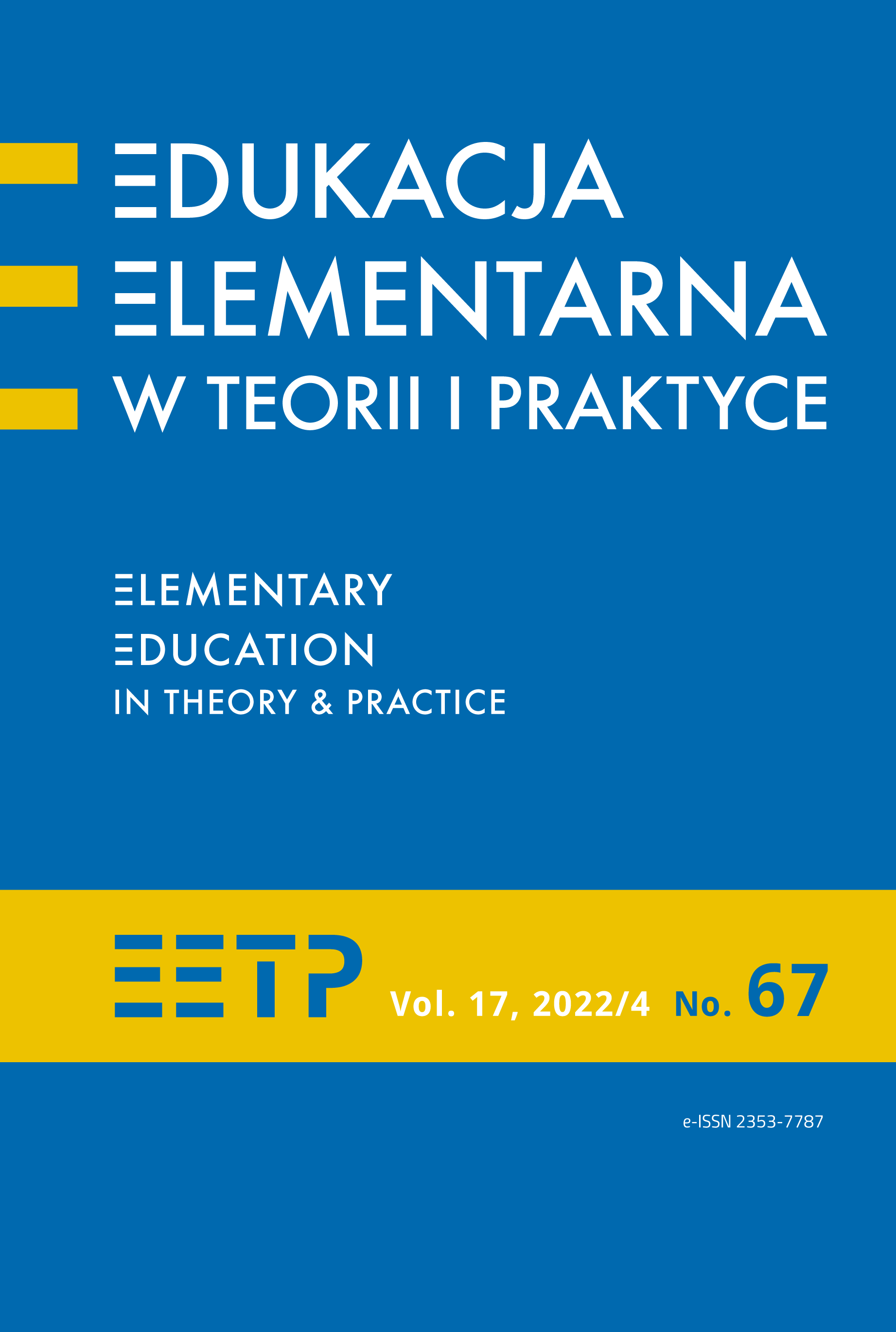Wychowanie do wartości dziecka z ASD – fundamenty terapeutyczne
Abstrakt
Niniejszy artykuł ma charakter teoretyczny i stanowi prezentację dwóch podstawowych fundamentów terapeutycznych, które powinny zaistnieć w oddziaływaniu terapeutycznym osób pracujących z dzieckiem z autyzmem, jeśli pragnie się dążyć do przekazywania im wartości. Celem artykułu jest uzasadnienie wyboru kompetencji językowych i zdolności do mentalizowania jako dwóch podstawowych obszarów, na których terapia winna być budowana (zwłaszcza terapia stawiająca sobie m.in. cele wychowywania do wartości). W pierwszej części tekstu uwaga został skupiona właśnie na tych dwóch obszarach – języku i mentalizowaniu – i ich ugruntowaniu naukowym w pracy z dziećmi z ASD. Szczególnie dużo miejsca zostało poświęcone mniej znanemu terapeutom i pedagogom specjalnym pojęciu mentalizowania. Wskazano między innymi uwarunkowania neurobiologiczne tego procesu, jego związek z uczeniem się, czy współzależności z kompetencjami językowymi. W drugiej części artykułu zaprezentowano, w oparciu o długoletnie doświadczenie praktyczne autorki tekstu, wybrane techniki terapeutyczne (jak np. technika komunikacyjna – dialog twarzą w twarz, technika prowadzenia dziennika wydarzeń czy trening regulacji emocji), które pomagają w realizacji celów nauki relacji i wychowywania do wartości.
Bibliografia
Allen J.G., Fonagy P., Bateman A.W. (2014). Mentalizowanie w praktyce klinicznej, tłum. M. Cierpisz, Kraków: Wydawnictwo Uniwersytetu Jagiellońskiego.
Brothers L. (1997). Friday’s Footprint: How Society Shapes the Human Mind, New York: Oxford University Press.
Cieszyńska J. (2011). Wczesna diagnoza i terapia zaburzeń autystycznych. Metoda Krakowska, Kraków: Omega Stage Systems.
Cieszyńska-Rożek J. (2013). Metoda Krakowska wobec zaburzeń rozwoju dzieci. Z perspektywy fenomenologii, neurobiologii i językoznawstwa, Kraków: Omega Stage Systems.
Godlewski G., Mencwel A., Sulima R. (2003). Antropologia słowa. Zagadnienia i wybór tekstów, Warszawa: Wydawnictwo Uniwersytetu Warszawskiego.
Jańczak M. (2018). Mentalizacja w praktyce klinicznej – perspektywa psychodynamiczna, „Psychoterapia”, nr 4 (187), s. 5–17.
Kurcz I. (1987). Język a reprezentacja świata w umyśle, Warszawa: Państwowe Wydawnictwo Naukowe.
Maruszewski T., Doliński D., Łukaszewski W., Marszał-Wiśniewska M. (2020). Emocje i motywacja, [w:] J. Strelau, D. Doliński (red.), Psychologia akademicka, t. 1, Gdańsk: Gdańskie Wydawnictwo Psychologiczne, s. 513–649.
Orłowska-Popek Z. (2017). Programowanie języka w terapii logopedycznej, Kraków: Wydawnictwo Naukowe Uniwersytetu Pedagogicznego.
Ricoeur P. (1989). Język, tekst, interpretacja. Wybór pism, tłum. P. Graff, K. Rosner, Warszawa: Państwowy Instytut Wydawniczy.
Soroko E. (2007). Regulacja emocji w kontekście rozwoju osobowości, [w:] Ł. Kaczmarek, A. Słysz (red.), Serce i umysł, Poznań: Wydawnictwo Naukowe Uniwersytetu Adama Mickiewicza, s. 55–81.
Tomasello M. (2002). Kulturowe źródła ludzkiego poznawania, tłum. J. Rączaszek, Warszawa: Państwowy Instytut Wydawniczy.
Winczura B. (2010). Wstęp, [w:] tejże (red.), Autyzm na granicy zrozumienia, Kraków: Impuls, s. 7–8.
ICD-11. International Classification of Diseases 11th Revision. https://icd.who.int/en
Copyright (c) 2022 Edukacja Elementarna w Teorii i Praktyce

Utwór dostępny jest na licencji Creative Commons Uznanie autorstwa – Bez utworów zależnych 4.0 Międzynarodowe.
1. Autor zgłaszając swój artykuł oświadcza, że jest Autorem artykułu (zwanego dalej Utworem) i:
- przysługują mu wyłączne i nieograniczone prawa autorskie do Utworu,
- jest uprawniony/a do rozporządzania prawami autorskimi do Utworu.
Oświadcza, że nie narusza praw autorskich osób trzecich i praw prawnych.
Oświadcza, że nie występuje żaden konflikt interesów.
2. Udziela Uniwersytetowi Ignatianum w Krakowie nieodpłatnej, niewyłącznej, nieograniczonej terytorialnie licencji do korzystania z Utworu na następujących polach eksploatacji:
- utrwalania utworu w formie papierowej, a także na nośniku cyfrowym lub magnetycznym;
- zwielokrotnienia utworu dowolną techniką, bez ograniczenia ilości wydań i liczby egzemplarzy;
- rozpowszechniania utworu i jego zwielokrotnionych egzemplarzy na jakimkolwiek nośniku, w tym wprowadzenia do obrotu, sprzedaży, użyczenia, najmu;
- wprowadzenia utworu do pamięci komputera;
- rozpowszechniania utworu w sieciach informatycznych, w tym w sieci Internet;
- publicznego wykonania, wystawienia, wyświetlenia, odtworzenia oraz nadawania i reemitowania, a także publicznego udostępniania utworu w taki sposób, aby każdy mógł mieć do niego dostęp w miejscu i czasie przez siebie wybranym;
- w zakresie praw zależnych do Utworu, obejmujących w szczególności prawo do dokonania koniecznych zmian w Utworze, wynikających z opracowania redakcyjnego i metodycznego, a także do dokonania tłumaczenia Utworu na języki obce.
Udzielenie licencji następuje z chwilą przekazania Utworu na rzecz Uniwersytetowi Ignatianum w Krakowie. Uniwersytet Ignatianum w Krakowie jest uprawniony do udzielania dalszych sublicencji do Utworu, w zakresie udzielonego prawa. Licencja jest ograniczona czasowo i zostaje udzielona na okres 15 lat, licząc od daty jej udzielenia.
Wyraża się zgodę i zachęca autorów do publikacji ich tekstu w Internecie (np. w repozytorium instytucji lub na jej stronie internetowej) przed lub podczas procesu składania tekstu jako, że może to prowadzić do korzystnych wymian oraz wcześniejszego i większego cytowania opublikowanego tekstu (Patrz The Effect of Open Access). Zalecamy wykorzystanie dowolnego portalu stowarzyszeń badawczych z niżej wymienionych:




